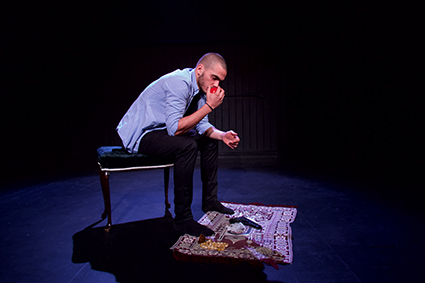Gay Muslim immigrant pride
Nerida Dickinson: Once We Were Kings

Once We Were Kings
photo Mustafa Al Mahdi
Once We Were Kings
Pride shines through in intimate tales of love, loss, rejection and steadfast memory. Once We Were Kings presents a collection of richly evocative vignettes of life as experienced by gay Muslim immigrants to Australia. The fluent beauty of the language is a tribute, a call to bear witness and a seized opportunity to share stories.
Self-discovery takes many routes in these overlapping monologues, with specific details catching the heart and imagination—letters hidden in a pot plant, furtive holding of fingers under a pizza box (from the halal place) and the last memory of a grandfather. Common themes abound: rejection by fellow believers, rejection by lovers, loss of cultural identity with migration and loss of family connections. This small cluster of shared life experiences is marked by its acceptance of a diversity of voices. No single authoritative narrative dominates this sub-sub-culture, its commonality based in the suffering of social rejection and denial of personal validity.
Cashews and pomegranates—motifs of sweet and sour, pride and heritage—evoke memories flowing through more tangible recollections of regret and loss. Delivered direct to the audience in a stylised manner, the vignettes combine angst, nostalgia, anger, bitterness and humour. Concealing identifying details, names of people and places, dates and events beyond the confronting immediacy of the personal moments shared here, the stories’ contributors reveal the raw nature of their truths, still stinging nerves not yet ready for the bracing air of public scrutiny.
Three young actors, Angela Mahlatjie, Solayman Belmihoub and Naomi Denny, deliver demanding material clearly, without hesitation. The stylised manner of presentation removes some dramatic opportunities, but their delivery echoes the detachment necessary to survive some of the situations and frustrations. Director Mustafa Al Mahdi guides his cast to connect with the audience through a kaleidoscopic selection of abstractly styled, intimate moments—a challenge met with understated dramatic skill by the performers.
Using deceptively simple staging, Al Mahdi sacrifices potential dramatic vigour in favour of creating a visually arresting stage-scape. Dim lighting loses some details but conveys strong impressions, each performer’s body becoming part of the scenery, moving simply and deliberately. This overall stillness lends clarity to words, giving Dure Khan’s beautifully written free verse-script room to breathe, the strong, static stances impacting profoundly.
Thoughtfully composed projections enhance the sensation of large-scale installation with red drops pooling on a performer’s white gown, the recollection of a voice intermingled with water burbling from a corner and dimly traced dancers flickering on the wall—echoing the dim reminiscence of a first teen crush. The soundscape’s intense, rapid rhythms complement the pace of speech in some pieces with a pounding beat and amplify the angst in others with edge-of-awarness humming.
Khan’s richly lyrical script captures the difficulties of becoming a Crescent Moon-shaped peg in a Southern Cross-shaped hole and resolutely challenges norms of mainstream Australian society, the taboos of Islam and narrative expectations. Walking through the accompanying exhibition provides space for reflection and a continuing sensation of intimate and personal experience with childhood photos of the actors scattered through a pile of suitcases and belongings that evoke individual histories amid more abstract sculpture and photography.
Third Culture Kids have a voice, insistent to be heard. Once We Were Kings is a showcase of defiant pride, exploring artistic possibilities that challenge cultural and social expectations. Simply being part of the audience feels like witnessing a creative movement establish its own space in modern Australia.
Third Culture Kids and The Blue Room Theatre, Once We Were Kings, director, producer Mustafa Al Mahdi, writer Dure Khan, co-director Alex Kannis, lighting Devon Lovelady, sound design Thomas Moore, cinematographer Lincoln Russell, The Blue Room Theatre, Perth, 12-29 May
RealTime issue #128 Aug-Sept 2015 pg. 45






